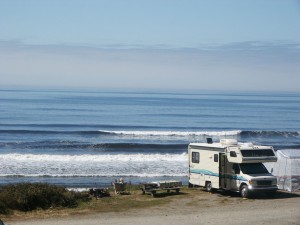 When you take the ultimate step and decide to be a serious boondocker, you make a few modifications to your camping regimen and install some new features like a sustainable energy source consisting of solar panels, a wind generator, or a fusion nuclear generator [have they invented those yet?] to your RV that you might be hesitant to invest in until you know you like and plan to continue boondocking.
When you take the ultimate step and decide to be a serious boondocker, you make a few modifications to your camping regimen and install some new features like a sustainable energy source consisting of solar panels, a wind generator, or a fusion nuclear generator [have they invented those yet?] to your RV that you might be hesitant to invest in until you know you like and plan to continue boondocking.
When you take the ultimate step and decide to be a serious boondocker, you make modifications to the way you camp and add certain features like installing a sustainable energy source like solar panels, a wind generator, or a fusion nuclear generator [have they invented those yet?]) to your RV that you might be hesitant to invest in until you know you like the lifestyle.
But in the meantime, you can follow the tips below to reduce your electrical usage – and the amount of time you need to run your noisy generator to recharge your batteries.
- Turn off all appliances, lights, radio, TV, and anything else that requires electricity when not in use.
- Don’t leave your porch light on (a particular annoyance to me when I am not so fortunate to be able to camp away from neighbors, and he/she leaves the light on, ruining my night vision for seeing night critters and star gazing).
- Coordinate your generator running time with the use of power-hungry appliances. For instance, schedule your showers, water heater, use of microwave, coffee grinder, and dishwashing all within a short period of time when you can run your generator to power them, rather than pull juice out of your batteries. This also charges you batteries at the same time.
- Time your day to match the sun, rising when it does and going to bed with it also. This cuts your light usage down considerably.
- If you read in bed, try using small rechargeable battery powered reading lights. You can recharge the batteries when you hook up next time and you won’t run down your house batteries with your RV’s lights. And you will probably disturb your mate less.
- Monitor your house batteries charge with a voltage meter so you don’t run them down too low, which can damage the batteries. Deep cycle batteries are considered fully charged at about 12.6 volts and completely discharged at 10.6 volts. Recharge before they get below 60%, or about 12.0 volts.
In addition to these ways to cut your electric usage, there will be times when you are in an LTVA or other boondocking or dry-camping situation (like a rally or week-end event) where you have close neighbors.
Remember that there are all kinds of RVers, some—maybe yourself included—who do not mind the noise of a generator running and don’t even consider that the noise or exhaust fumes may annoy others.
I remedy this, as I’m sure others do, by taking a walk during the time my neighbor will be running his generator. But it would annoy me if I had just settled down in my camp chair with a glass of the bubbly when my neighbor fires up his generator. Be courteous to your neighbor and he will likely return the courtesy.
When you need to recharge your batteries, explain to your neighbor/s that you have to run your generator, and the length of time you expect to run it, and ask when would be a good time when it wouldn’t bother him/her. Maybe you can all coordinate times.
Avoid running your generator past a reasonable hour in the evening when others may be relaxing, sitting outside enjoying the stars and the quiet, or trying to sleep. The same rule holds for the morning before the late risers greet the day.
For more RVing articles and tips take a look at my Healthy RV Lifestyle website, where you will also find my ebooks: BOONDOCKING: Finding the Perfect Campsite on America’s Public Lands (PDF or Kindle), 111 Ways to Get the Biggest Bang for your RV Lifestyle Buck (PDF or Kindle), and Snowbird Guide to Boondocking in the Southwestern Deserts (PDF or Kindle), and my newest, The RV Lifestyle: Reflections of Life on the Road (Kindle reader version). NOTE: Use the Kindle version to read on iPad and iPhone or any device that has the free Kindle reader app.
Good tips! These will definitively come in handy when reducing the use of electricity.